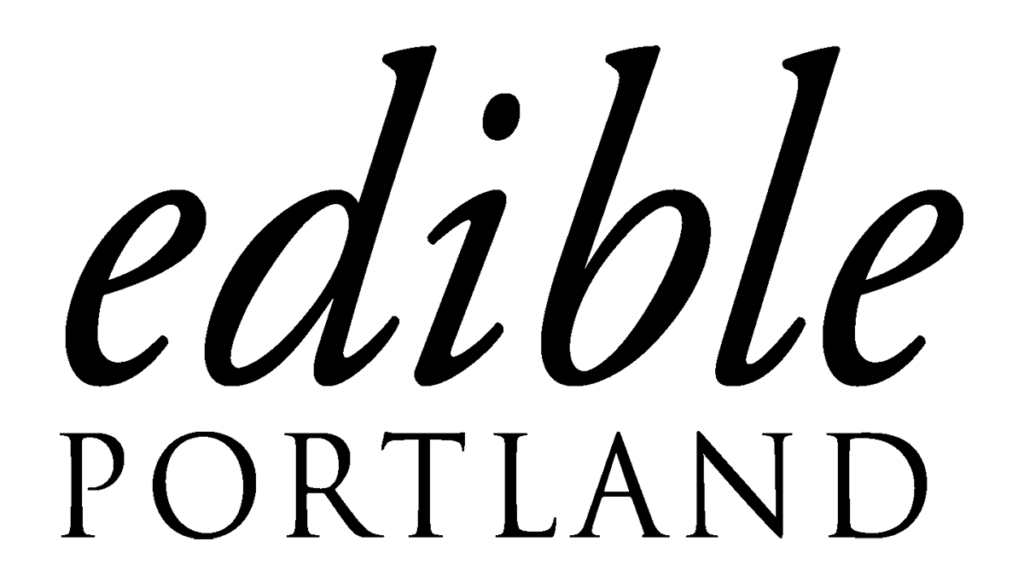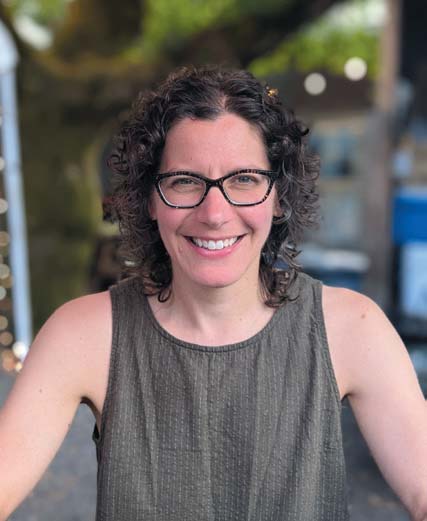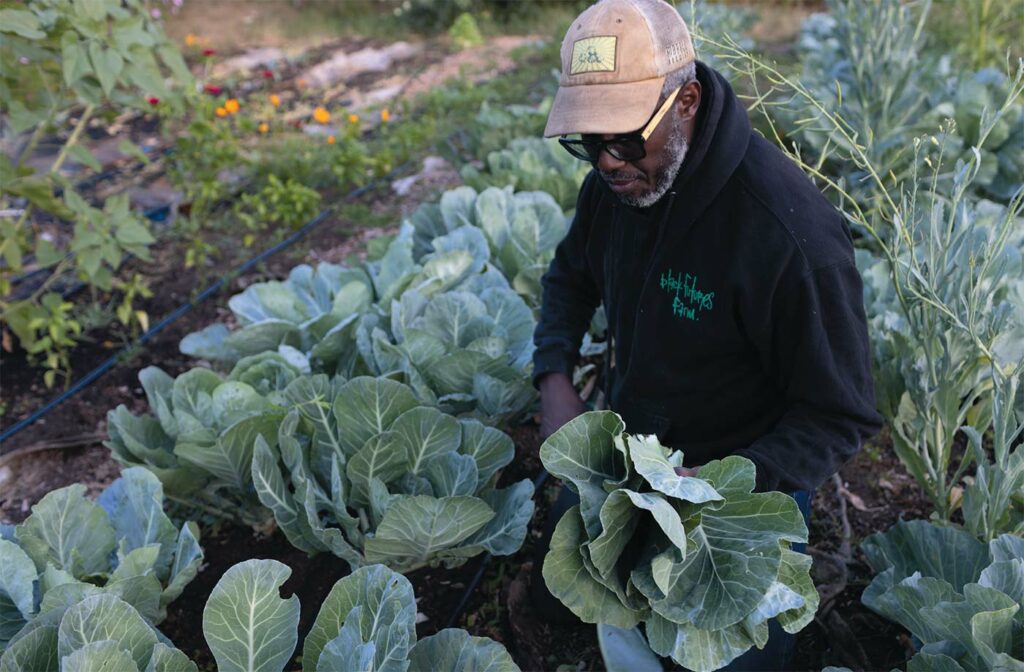
Images by Celeste Noche
A MISSION TO REVIVE LAND AND COMMUNITY
At Black Futures Farm (BFF), co-founders Malcolm Hoover and Mirabai Collins are sowing the seeds of a new relationship with the land—one that empowers Black Americans to reconnect with their roots, honor their history, and heal. Along the way, Hoover and Collins have found personal healing as well.
We are on land in the Brentwood-Darlington neighborhood of Portland that is thought to once have been a dairy farm but is now managed by the city. Brentwood-Darlington is located in the far southern end of Portland, away from the popular restaurants and bars that hum on a Saturday night. Squatting among the garlic and beets as we weed, I ask Hoover “Who is your community?” He replies: “Whoever is here. Whoever shows up.”
Collins weaves through the aisles of chard and collards, towards the back of the garden, between a couple of fruit trees and around a bend out of sight. She walks the meandering path with a sense of purpose. As Hoover continues to tell the story of BFF’s beginnings, water erupts from the sprinklers, revealing the agenda behind Collin’s movements.
Black Futures Farm is a Black-centered production farm and community-building space in southeast Portland, dedicated to restoring the connection between Black people and the land. As a collaborative movement, BFF works in solidarity with Black, Indigenous, and other people of color to stabilize local and regional food systems, support grassroots initiatives, and conserve natural resources. Hoover and Collins independently found their love for farming before they met, walking their own meandering paths on their way to Black Futures Farm.
HEALING THROUGH FARMING: THE STORIES BEHIND BLACK FUTURES FARM’S FOUNDERS
Recovery from addiction brought Hoover to farming through the community of Mudbone Unity Farm, which aims to localize the food economy for Black and African-American communities. The instant Hoover’s hands touched the soil, he reported feeling better. “Alright—message received!” Hoover exclaims in recollection of that moment. His father’s words reinforced his healing path: do what works, don’t do what doesn’t. The act of farming was the way for Hoover to confront and accept himself, and find a way forward. Hoover worked in family social services after his time at Mudbone Unity Farm.
One of his responsibilities was overseeing family visits between children and their parents involved in the court system. Looking out his office window one day, he envisioned opportunity in the overgrown lot across the street. The soil had been a source of healing for Hoover and he thought it may convey the same benefits for the families he supported. He transformed that underutilized land by exploring the possibilities and collaborating with people from other organizations. Hoover was pleased to provide a comfortable place where families in turmoil could garden together during their supervised visits. This arrangement allowed them to nurture both the land and their relationships. This once-overgrown lot is now Black Futures Farm.
Collins’s first exposure to agriculture was a farm internship at Redwood Roots in Humboldt, California. She found solace there to cope with the grief of her brother’s imprisonment. “I’d shake from the fear and sadness of what happened to him, and when I was farming, I didn’t feel that,” Collins told me as she pulled up the crabgrass from the end of a row of chard.
Collins came to the Portland area to care for her ailing grandmother. Looking for ways to connect with the Black community, she saw an advertisement for a community workshop about farming that piqued her interest. Collins arrived at the event with hesitation, and just when she was about to turn back from anxiety, someone called out to her.
It was Chris Odom, a Black activist and Director of the Black Economic Collective. He was greeting people at the event and welcoming them to participate. “I wouldn’t have gotten connected to the community without that event and Chris,” Collins says. She considers this moment to be instrumental in finding the farming community in Portland.
At the workshop, participants brainstormed ways to bring vegetables and gardening closer to the Black community, developing a list of project ideas that included installing a wash and pack station at a farm, building gardens on balconies, and utilizing vacant land. The event concluded with a list of priority projects and excitement to start working on them. After learning a bit about Collins, Odom told her, “You’ve got to meet Malcom!”
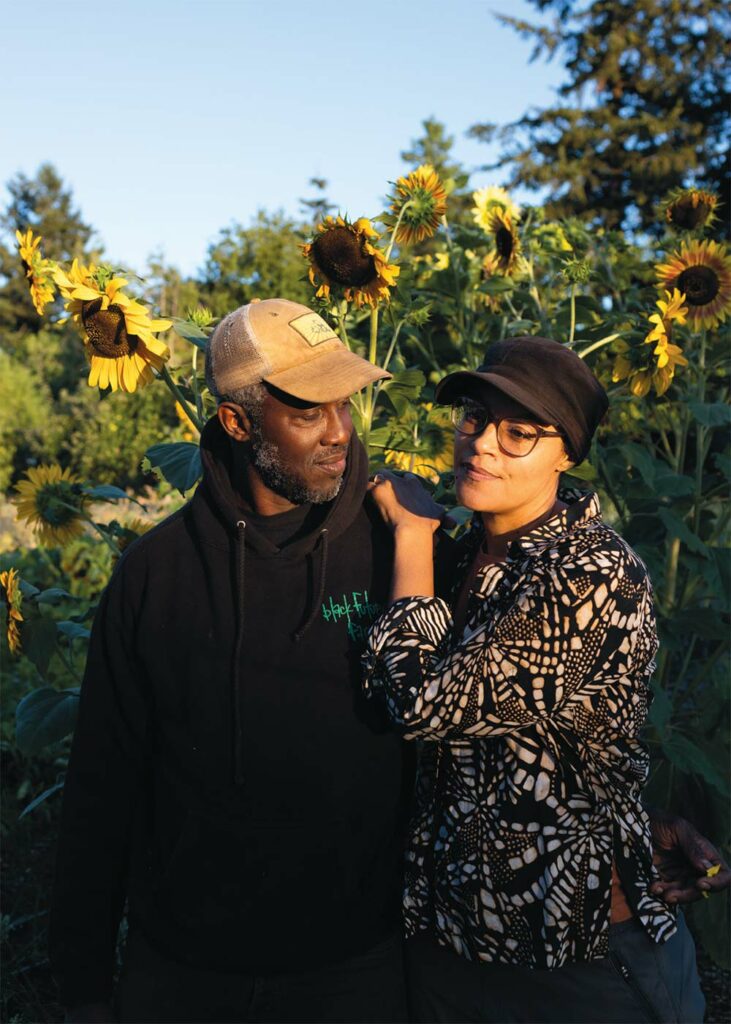
DEEP ROOTS OF FARMS AND COMMUNITY
Unity Farm, WeGrow PDX, and Happiness Family Farm were all initiatives from the community farming workshop. The names reflect the intention and hopes of people working the land to support one another. Following these initiatives, Black Futures Farm has come to fruition as a program of the Black Food Sovereignty Coalition (BFSC). The Coalition’s mission is to act as a hub for collaboration and provide support for Black and Brown community members to have agency in food systems, placemaking, and economic development.
BFF holds events on the farm and distributes its produce to various community-based organizations. The main regular event on the farm is Black Sundays, a time for the Black community to come together and share a meal. Having time and a place of their own to be together is an opportunity to celebrate and learn. BFF donates most of its food through partnerships with schools, food pantries, and other organizations. This season, they’re distributing to the Feed’em Freedom Foundation’s WINGI program, Lane Food Pantry, Lewis and Clark’s Farm to Fork initiative, and special events such as Free Geek’s Achieve Summer Send-Off at Oxbow Park. BFF also supplies produce for Camp Yoshi, an outdoor adventure company focusing on Black and Brown people and hosts events at the farm for its partners, including REACH Community Development Corporation, Imagine Black, Urban League, Growing Gardens, People of Color Outdoors, Coalition Of Black Men, EMSWCD, Afro Village PDX, Black Community of Portland, and Zenger Farm. Through shared values and complementary goals, BFF and AfroVillage PDX have developed a friendship and partnership. As Collins spoke about the many connections between people and organizations, I imagined a family tree with myriad branches and offshoots. When I shared this with her, Collins paused and said, “It’s more like roots.” We both smiled at the insight. These community connections are deeply rooted in the soil, and as these roots spread, they nurture sustainable food systems and strengthen relationships, supporting and enriching the Black community.
CULTIVATING AGENCY WITHIN THE FOOD SYSTEM
In its evolution, Black Futures Farm embodies the spirit of resilience, sovereignty, and self-determination. Hoover and Collins embrace the land’s history and its potential with an open heart, cultivating 17 diverse fruit trees and envisioning a future shaped by community needs. Among the plants they found growing on the land is cardoon, a versatile plant with culinary, medicinal, and ecological benefits. While they are currently allowing it to thrive naturally, it may become a part of future projects on the farm.
The Community Placemaking Grant from Oregon Metro has been instrumental in advancing BFF’s mission. It has enabled the farm to employ a dedicated team, from a full-time farmer to a clean energy intern, fostering both economic and social growth within the community. Collins efforts in securing funding and Hoover’s role in providing engaging tours exemplify their complementary skills and dedication to the farm’s success. Collins poignantly remarks, “Africans call us slave stock. The diaspora are yearning for roots.”
This yearning is addressed profoundly through BFF’s initiatives. She further emphasizes, “Agriculture is the throughline for our people,” underscoring how farming is a crucial link to cultural identity and heritage.
BFF is more than just a farm; it is a vibrant community hub where food, knowledge, and cultural heritage converge. Through workshops on soil health, clean energy, and a forthcoming CSA share program, Malcolm and Collins ensure that BFF remains a place where the Black community can thrive, learn, and reclaim their autonomy. Looking ahead, BFF is slated to become its own nonprofit organization in 2026, marking a new chapter in its mission. Spending time with Malcolm and Collins at the farm revealed a profound sense of purpose. They are not only tending the land but also nurturing food sovereignty. In a state where Black land ownership was once illegal, BFF represents a powerful reclamation of the means of production, consumption, and distribution. Here, Malcolm and Collins are making history, cultivating both the land and the future, for themselves and for the community.
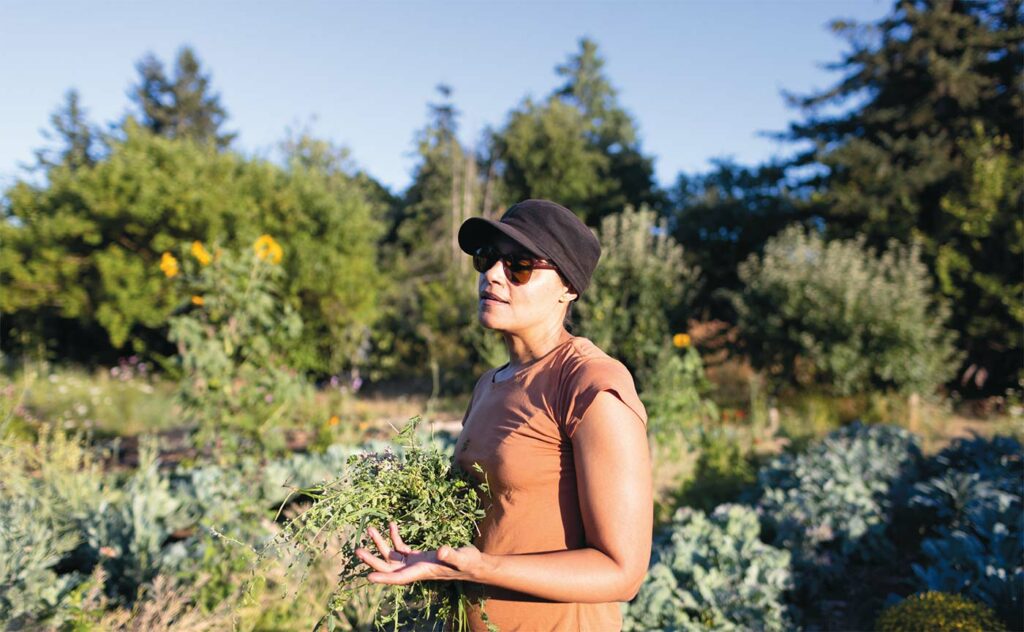
MALCOLM’S FAMILY GREENS
Malcolm’s grandmother always had a pot of greens on the stove, and he’s generously recounting her recipe below.
- Boil a smoked turkey thigh in a large pot.
- Chop an onion and fry it in cast iron until translucent.
- Add Lawrey’s or Johnson’s seasoning salt to the pot.
- Take a large bunch of greens—turnip, mustard and collard are the holy trinity of greens, but any will be great. Stack the leaves, roll them up, then slice them into ribbons. Toss the greens on top of the turkey in the pot. Once the greens soften, push them down into the stew.
- Cook on low until the meat comes off the bone, 45 minutes to one hour.
